- February 20, 2021
- By neon31
- In Gods Unchained, Sponsored
- No Comment
- 0
Gods Unchained Beginner Guide: Learn The Basics
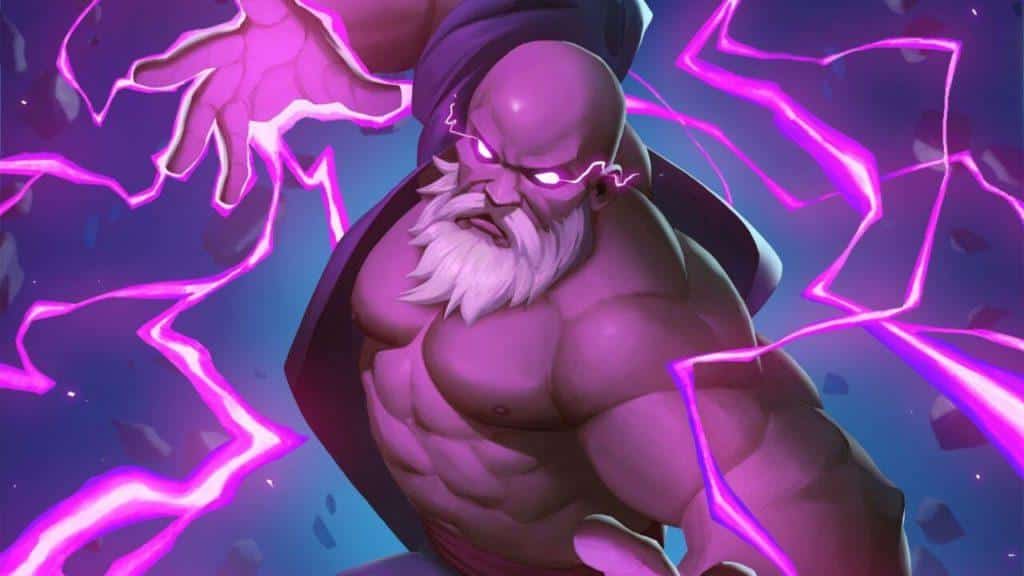
What is Gods Unchained?
Gods Unchained is a free-to-play tactical card game that gives players true ownership of their in-game items. Led by the former game director of Magic The Gathering: Arena, the game focuses on competitive play, which means players must strategically outsmart their opponents by building decks that are able to combat a wide variety of tactics. In Gods Unchained players completely own their digital items, giving them the freedom to trade, sell and use their cards any way they like – just like owning real, tangible cards.
You win by reducing the opposing god’s Health to 0 while making sure the same doesn’t happen to you in the process.
What are the card types?
» Relics
Relics are wielded by your god and provide you with the ability to send him or her directly into the battlefield, taking and dealing damage in the process.
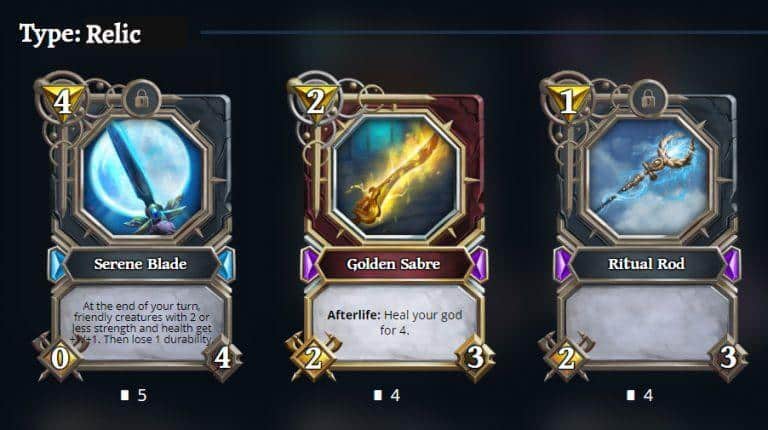
» Creatures
Creatures are combatant cards that get directly thrown into the fray. They have a physical representation on the battlefield with a given amount of Strength and Health – and usually some accompanying abilities and keywords as well (we’ll explore these in detail in a future article).
You can use them to directly attack the opposing god or to fight your opponent’s creatures in order to achieve supremacy on the field of battle. The correct strategy depends on the cards you decide to add to your deck, the ones your opponent has at their disposal, and, of course, just a little bit of luck, too.
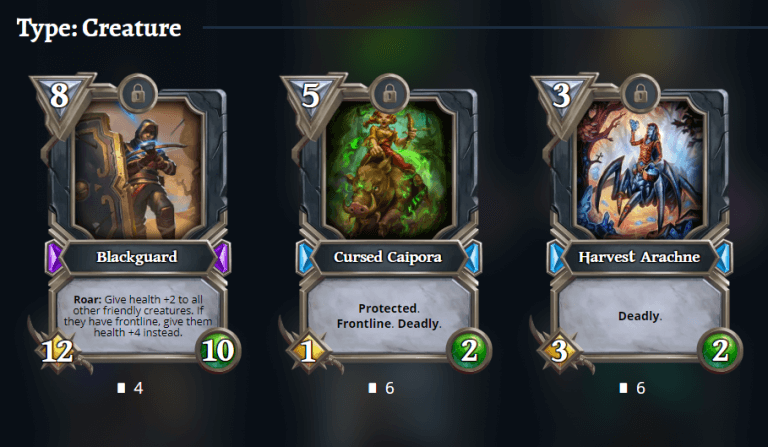
Minion Keywords:
- Afterlife – Any effects following the Afterlife: keyword trigger when the unit dies and before it enters the Void. Also known as: Deathrattle
- Roar – Any effects following the Roar: keyword trigger when the Creature or Relic is cast from your hand and before it actually enters the battlefield. Also known as: Battlecry
- Regen – A Creature with Regen X heal for X at the end of it’s controllers turn.
- Burn – A Creature with Burn X are dealt X damage at the end of it’s controllers turn.
- Confused – A Creature or Relic with Confused has a 50% chance of attacking the wrong enemy target.
- Blitz – A Creature or Relic with Blitz is able to attack enemy Creatures the turn it enters the battlefield.
- Godblitz – A Creature or Relic with Godblitz is able to attack enemy Creatures *or the enemy God* the turn it enters the battlefield.
- Deadly – A Creature or Relic with Deadly will destroy any Creature it damages, no matter how much damage was actually dealt. Also known as: Poisonous, Deathtouch
- Hidden – A Creature with Hidden cannot be targeted by the enemy. If the Creature attacks, it loses Hidden. (Importantly, Hidden prevents the enemy from targeting the Hidden Creature with anything, *including* attacks). Also known as: Stealth
- Frontline – If a Creature with Frontline is on one side of the field, other Creatures without Frontline on that side of the field cannot be targeted for attacks. Also known as: Taunt
- Backline – If Creature(s) with Backline are on one side of the field and there are Creature(s) without Backline on that side of the field, the Creature(s) with Backline cannot be targeted for attacks.
- Flank – A Creature with Flank ignores both Frontline and Backline effects if it is not the first attack that turn.
- Ward – A Creature or God with Ward nullifies the first targeted God Power or Spell cast on it.
- Protected – A Creature or God with Protected nullifies the first instance of damage dealt to it.
- Ability – A Creature or Relic with Ability cannot attack. Instead, you can click the unit to use the described ability.
- Soulless – A Card with Soulless won’t appear in the Void after being destroyed or used.
- Obliterate – Obliterating means to destroy a card without sending it to the void, or removing it from the Void if it’s already there. Also known as: Exile, Remove from game.
- Leech – A Card with Leech will give your God life equal to the damage it deals. Also known as: Lifelink, Lifesteal.
- Sleep – Giving a unit Sleep makes it miss its next attack. Also known as: Freeze
- Refresh – Refresh X mana means you refill X amount of mana, up to the amount of unlocked mana you have.
» Spells
Spells are the other tools at your disposal in the battle. They are instantaneous magical effects that immediately affect the board state in some capacity. Their potential is limitless.
Certain spells will let you deal a set amount of damage to every creature on the opponent’s side of the field, while others can add extra Health and Strength to yours. They can directly damage the opposing god, heal yours or vice versa.
In certain cases, they can even summon creatures, draw you extra cards or pull off some amazing, game-changing effects!
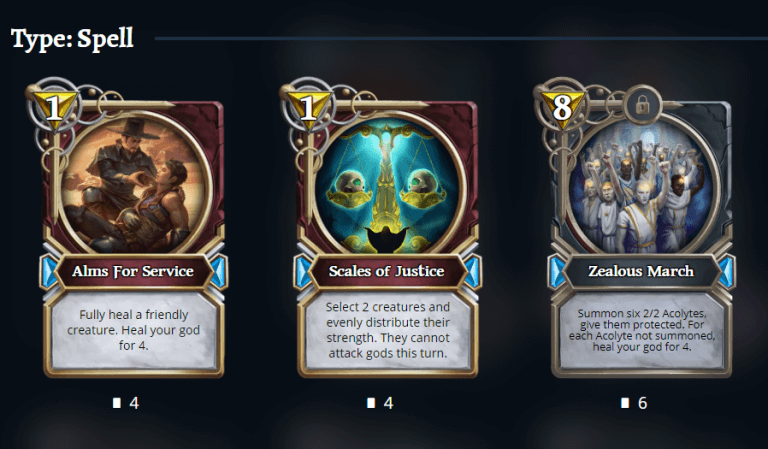
What are God powers?
God powers are unique abilities that are attached to each god and can be used once every turn. Using your god power does not require a card, but they’re always around to consider, making it less likely that you run dry and have to completely pass a turn.
Each god has 4 powers to choose from with different effects and Mana costs, with various advantages and disadvantages based on your own deck and your opponent’s.
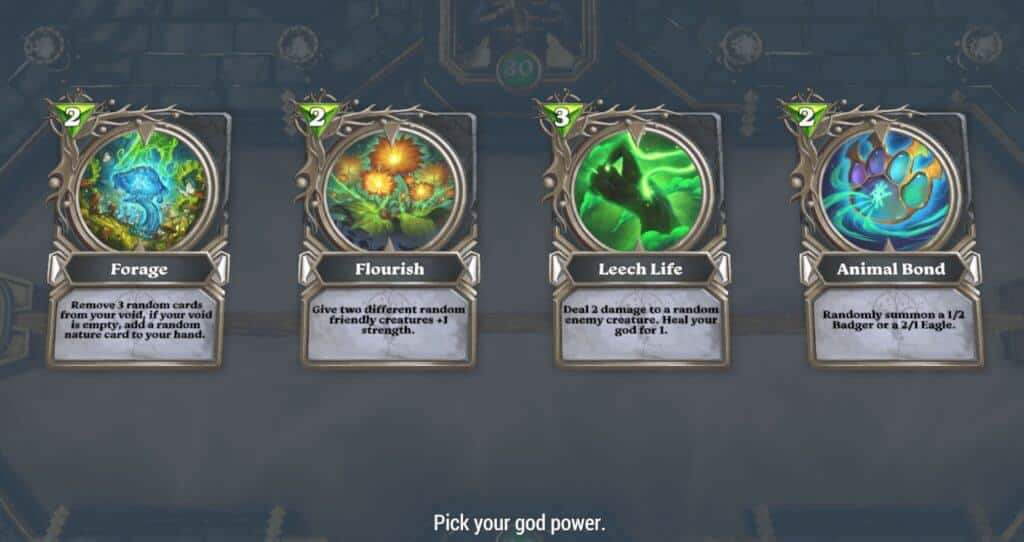
How does Mana work?
In Gods Unchained, you will unlock one mana lock at the start of each of your turn and refresh all empty mana gems. There is one lock on each of your first five mana gems, so you’ll be unlocking one gem turns 1–5, just like any other traditional automated system.
The sixth mana gem, however, starts the game with two locks on it, and won’t be accessible until turn 7. There will also be two locks on your seventh mana gem (accessible turn 9), three locks on your eighth mana gem (accessible turn 12), and four locks on your ninth mana gem (accessible turn 16). Summarized below:
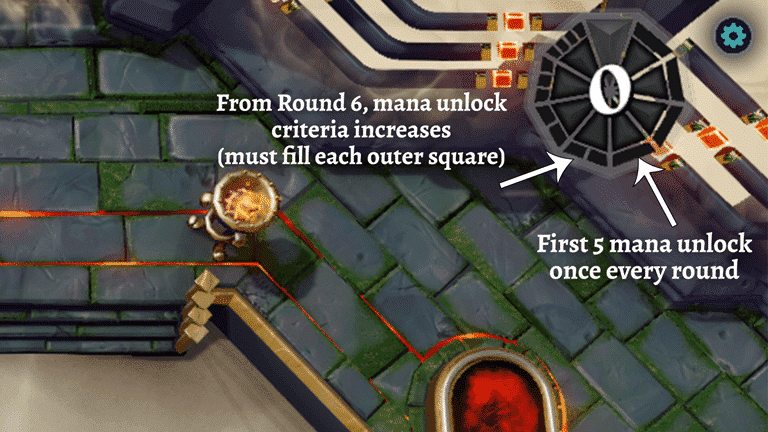
How does Combat work?
The attacker has the initiative in Gods Unchained, which means that you get to choose where the attacks of your different creatures (or the relic equipped by your god) go. While there are some limitations to this – for instance, you have to target creatures with the Frontline keyword first – this gives you a lot of flexibility.
You can only have six creatures at most on the board, and they deal damage equal to their Strength on your selected target. This value is then subtracted from their Health total. If a creature hits 0 health, it dies and disappears from the battlefield, sent to the Void for the rest of the game.
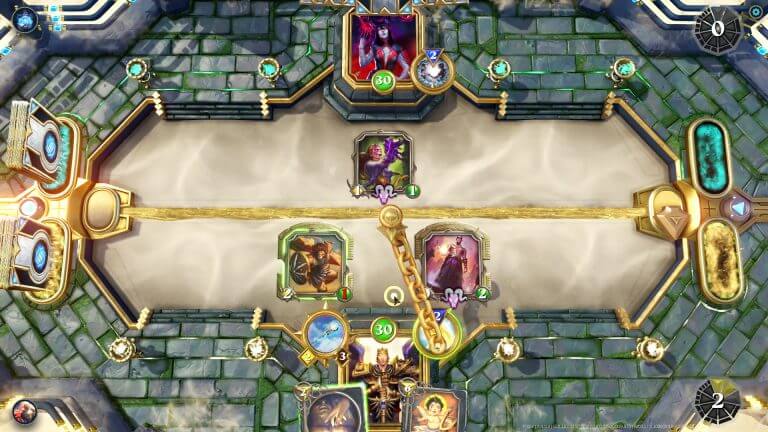
What is the Void?
The Void is the home of dead creatures and already cast spells, every card which has been played so far in the game and somehow removed from the action. Think of it as a card graveyard.
Watch out: certain gods and deck archetypes have the ability to interact with the Void and even bring back cards from the dead!
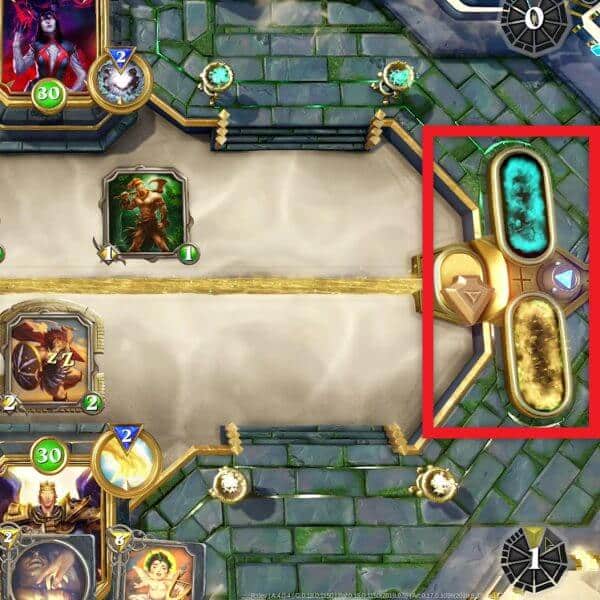
More Learn to Play Content
» Learn the Basics
» How to Build your deck
Submit your Top 500 Legend Build, be seen by thousands of people!
